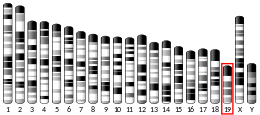UHRF2
E3 ubiquitin-protein ligase UHRF2 is an enzyme that in humans is encoded by the UHRF2 gene.[5][6]
This gene encodes a nuclear protein which is involved in cell-cycle regulation. The encoded protein is a ubiquitin-ligase capable of ubiquinating PCNP (PEST-containing nuclear protein), and together they may play a role in tumorigenesis.[6]
References
- 1 2 3 GRCh38: Ensembl release 89: ENSG00000147854 - Ensembl, May 2017
- 1 2 3 GRCm38: Ensembl release 89: ENSMUSG00000024817 - Ensembl, May 2017
- ↑ "Human PubMed Reference:".
- ↑ "Mouse PubMed Reference:".
- ↑ Mori T, Li Y, Hata H, Ono K, Kochi H (Aug 2002). "NIRF, a novel RING finger protein, is involved in cell-cycle regulation". Biochem Biophys Res Commun. 296 (3): 530–6. PMID 12176013. doi:10.1016/S0006-291X(02)00890-2.
- 1 2 "Entrez Gene: UHRF2 ubiquitin-like, containing PHD and RING finger domains, 2".
Further reading
- Gerhard DS, Wagner L, Feingold EA, et al. (2004). "The status, quality, and expansion of the NIH full-length cDNA project: the Mammalian Gene Collection (MGC).". Genome Res. 14 (10B): 2121–7. PMC 528928
 . PMID 15489334. doi:10.1101/gr.2596504.
. PMID 15489334. doi:10.1101/gr.2596504. - Unoki M, Nishidate T, Nakamura Y (2004). "ICBP90, an E2F-1 target, recruits HDAC1 and binds to methyl-CpG through its SRA domain.". Oncogene. 23 (46): 7601–10. PMID 15361834. doi:10.1038/sj.onc.1208053.
- Colland F, Jacq X, Trouplin V, et al. (2004). "Functional proteomics mapping of a human signaling pathway.". Genome Res. 14 (7): 1324–32. PMC 442148
 . PMID 15231748. doi:10.1101/gr.2334104.
. PMID 15231748. doi:10.1101/gr.2334104. - Li Y, Mori T, Hata H, et al. (2004). "NIRF induces G1 arrest and associates with Cdk2.". Biochem. Biophys. Res. Commun. 319 (2): 464–8. PMID 15178429. doi:10.1016/j.bbrc.2004.04.190.
- Humphray SJ, Oliver K, Hunt AR, et al. (2004). "DNA sequence and analysis of human chromosome 9.". Nature. 429 (6990): 369–74. PMC 2734081
 . PMID 15164053. doi:10.1038/nature02465.
. PMID 15164053. doi:10.1038/nature02465. - Mori T, Li Y, Hata H, Kochi H (2004). "NIRF is a ubiquitin ligase that is capable of ubiquitinating PCNP, a PEST-containing nuclear protein.". FEBS Lett. 557 (1–3): 209–14. PMID 14741369. doi:10.1016/S0014-5793(03)01495-9.
- Ota T, Suzuki Y, Nishikawa T, et al. (2004). "Complete sequencing and characterization of 21,243 full-length human cDNAs". Nat. Genet. 36 (1): 40–5. PMID 14702039. doi:10.1038/ng1285.
- Strausberg RL, Feingold EA, Grouse LH, et al. (2003). "Generation and initial analysis of more than 15,000 full-length human and mouse cDNA sequences". Proc. Natl. Acad. Sci. U.S.A. 99 (26): 16899–903. PMC 139241
 . PMID 12477932. doi:10.1073/pnas.242603899.
. PMID 12477932. doi:10.1073/pnas.242603899.
This article is issued from
Wikipedia.
The text is licensed under Creative Commons - Attribution - Sharealike.
Additional terms may apply for the media files.






